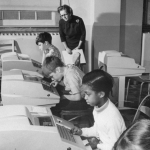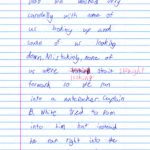2010
In his new book, Michael Wutz examines how the work of four canonical novelists - Norris, Lowry, Doctorow, and Powers - register the revolutions in 20th century media technology. Such an analysis, reviewer Joseph Conte suggests, is an important extension of Kittlerian media theory to the field of American literature.
Eric Dean Rasmussen explores Lynne Tillman's "cognitive aesthetic," suggesting that her work is powered by the generative disconnect between asignifying affect and signifying emotion. He argues that her 1998 novel, No Lease on Life, examines the role of affectively sustained universal values in responding politically to the neoliberal city.
Mark C. Marino explains the rationale for the Critical Code Studies Working Group, a six-week experiment in using social media for collaborative academic production. Marino also analyzes the first week's discussion, which focused on debates about what it means to read "code as text."
Marie-Laure Ryan argues that dysfunctionality in new media art is "not limited to play with inherently digital phenomena such as code and programs," and provides a number of alternative art examples, while also arguing that dysfunctionality "could [also] promote a better understanding of the cognitive activity of reading, or of the significance of the book as a support of writing."
2009
A snapshot of items on Joseph Tabbi's desktops, vertical and horizontal, presented at the Chicago meeting of the Modern Language Association in December 2007.
2008
Countering Andrew Gallix's suggestion in The Guardian that electronic literature is finished, author Dene Grigar indicates that it may not be e-lit, but rather the institution of humanities teaching, that is in a state of crisis - and e-lit in fact could be well placed one to revive the teaching of literature in schools and universities.
Eric Dean Rasmussen introduces a gathering of twelve essays on literary resistances that imagine how a materially engaged and affectively attuned literary culture might play a more transformative role in the emergent network society.
Joseph Tabbi surveys four recent interventions into new media studies, and argues that literary critics should not forget the power of the written word to resist the circumscribed possibilities of the current mediasphere. This review also appears in the Summer 2008 issue (Vol. 49, no. 2) of Contemporary Literature. The works under review include: The Souls of Cyberfolk: Posthumanism as Vernacular Theory by Thomas Foster; My Mother Was a Computer: Digital Subjects and Literary Texts by N. Katherine Hayles; Color Monitors: The Black Face of Technology in America by Martin Kevorkian; Mechanisms: New Media and the Forensic Imagination by Matthew G. Kirschenbaum
Through a mini-experiment Robert Lecusay explores the differences between gamers' and non-gamers' interactions with non-player characters in Michael Mateas and Andrew Stern's Façade.
Tim Uren argues that each improvisational theater scene functions as a game that generates its own rules within a few seconds of its inception, rules based on each performer's observation of the audience and/or other actors.
Celia Pearce applies the logics of identity politics, diaspora studies, and cultural studies to an online gaming community.
Adrianne Wortzel explains a revisioning of the 1960s computer-based therapist simulator, which moves beyond the original's text-only interface to include graphics, robotics, and an ever-expanding vocabulary.
Joe Scrimshaw describes his interactive stage drama, which with the exception of the technologies it employs, operates much like the computer-based interactive fiction Facade (discussed elsewhere in this thread). Rather than using code to select the proper reaction to user input as in Facade, the audience of Adventures in Mating votes on the choices the characters make, a la a Choose Your Own Adventure novel.
Nick Fortugno describes a live-action role-playing game with a real-world consequence - a marriage proposal.
Jane McGonigal argues that pervasive games - which involve electronic and 'real world' missions - reverse the traditional conception of the power dynamics of gaming, which has understood gamers as free agents. In contrast, according to McGonigal, designers of pervasive games exercise power over players, though their control is ultimately compromised by players' interpretive agency.
Teri Rueb describes Itinerant and quotes excerpts from the project's vocal track. The installation-style piece uses a GPS system and a headset. As the participant walks through the allotted space, the GPS cues various recordings. Rueb claims to want "to implicate the participant as a charged body in public space whose movement and presence become critical agents in structuring the meaning of the work."
Sean Thorne explains how he uses Puppetland to help children improve their writing. The RPG allows the students to develop characters, and to participate in the construction of stories so that they're imaginatively invested in what they write.
Kevin Whelan argues that there's not much difference between role-playing games and grass-roots political activism.
John Tynes argues that it took the novel two hundred years to gain cultural capital; film, forty years; rock and roll, fifteen. Given this increasing velocity and the fact that it's been three decades since Colossal Cave Adventure, interactive storytelling should have gained a much higher level of respect than it has. Tynes argues that games should eschew escapist fantasy for more timely "engagist" settings that would allow the player to reflect on contemporary life and politics.
Corvus Elrod extends Bruno Faidutti's claim that all games tell stories by making the counter-intuitive argument that board games like Chess and Go are more effective story vehicles than RPGs.










